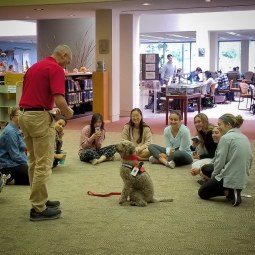Nov
26

Posted by NNLM Region 7 on November 26th, 2019
Posted in: Commentary, NLM Resources
Tags: Animals, Burnout, Dogs, Stress, Student Wellness, Therapy
The Lamar Soutter Library at the University of Massachusetts Medical School has started a program called “Fur-get the stress”. There are games, coloring, museum passes, and other activities, but the main highlight is a therapy dog that comes in every other week. Finn (short for Finnegan) is the dog that visits the library. He is a 2 ½ year old labradoodle (a lab, poodle mix). The students and the staff love him.
 Lots of schools have started trying to find ways to increase student wellness. This seems especially important in high pressure, intense places like medical school. A study in the Annals of Internal Medicine found that approximately 50% of students experienced burnout, a state defined by emotional exhaustion associated with work-related stress, feelings of detachment toward patients, and a low sense of personal accomplishment. The American Medical Association published the article Medical school burnout: How to take care of yourself which talks about the reasons for and strategies to overcome the immense pressure and burnout that occurs. One place that many schools and students have not looked for relief is from the library. But many libraries are now putting on programming and advocating for student wellness.
Lots of schools have started trying to find ways to increase student wellness. This seems especially important in high pressure, intense places like medical school. A study in the Annals of Internal Medicine found that approximately 50% of students experienced burnout, a state defined by emotional exhaustion associated with work-related stress, feelings of detachment toward patients, and a low sense of personal accomplishment. The American Medical Association published the article Medical school burnout: How to take care of yourself which talks about the reasons for and strategies to overcome the immense pressure and burnout that occurs. One place that many schools and students have not looked for relief is from the library. But many libraries are now putting on programming and advocating for student wellness.
At the Columbia University Medical Center, a weekly visit from a dog can bring 20-100 students, most who “end the encounter feeling lighter, happier, and more relaxed.” The library at Harvard Medical School has regularly brought in therapy dogs for many years and continues to grow its program in response to demand. The Cushing/Whitney Medical Library on the Medical Campus of Yale University found the library had “the opportunity to reinvent itself not only as a place to study and socialize but also a place that provides opportunities for relaxation and stress reduction through opportunities such as a therapy dog program.”
There is a growing body of research literature that has been produced that supports the use of therapy animals in the treatment of a number of conditions. There is the Medical Subject Heading (MeSH) term of Animal Assisted Therapy. A search of articles with with Animal Assisted Therapy as a MeSH term brings up 538 results. MedlinePlus directs searchers to a resource from the Mayo Clinic about the use and benefits of Pet Therapy. A February 2018 article from the NIH News in Health titled The Power of Pets details the health benefits of Human-Animal Interactions.
Ultimately, the way libraries are interacting with students is changing. The library has always been a safe place that provided students with information and services that they needed. With the changing nature of what students need, it is a good time for libraries to re-evaluate what types of information and services can be provided. It might be wellness activities, help with research and projects, or just a quiet place to escape or study. Libraries will continue to play an important role in student’s lives.
A version of this blog post was originally posted on NNLM NER Associate Director Martha Meacham’s blog, here.